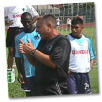Paradigm for Athletic Development Program
This is a paradigm I have used for years. It has worked well for me and my colleagues. It certainly has grown and evolved over the years but the basic ideas are the same. I truly believe that by applying this paradigm and understanding the basic principles of training that you should be able to work effectively with any sport. Here is the paradigm:
# 1 - Know the Demands of the Game or Sport
# 2 - Know the Demands of the Position or Event
# 3 - Know the Qualities of the Individual Athlete
# 4 - Know the Pattern of Injuries in the Sport
Over the years I have found that if I deviate from this then there are problems. Once I have gone through the evaluation of these four steps then it is a matter of determining the need to do versus the nice to do training activities. This simple paradigm will allow you to derive as complex a training program as needed. This paradigm really evolved when I was working as Al Vermeils’ assistant working with the Chicago Bulls in the mid eighties. I thought that some of the things I was having the players do in regard to conditioning were not really based on the game of professional basketball, so I went to Al to get the video guy to shoot individual isolated video of our top six players in games. What a revelation, it was not basketball it was more like football or wrestling. It certainly made me rethink my ideas about conditioning for pro basketball. I do not know what was done with in regard to the Bulls, because I left soon after that to go to work for the White Sox. I know that with the White Sox we carefully studied the demands of the game, individual positions and the individual players. It is all part of a comprehensive system of athletic development. With the sophisticated tools available today there is no excuse for what we see today in regard to conditioning for various sports. The conditioning must fit the game, the position and the athlete and must prevent injury. Too often we are trying to force the athletes into boxes. Thing like the big three or distance running for speed power athletes’ simply do not reflect reality of sport demands. As the old cowboy used to say, you can lead a horse to water, but you can’t make them drink.


6 Comments:
Vern,
What do you think of this paradigm as far as exercise perscription?
Effectiveness first.
Intensity second.
Frequency Third.
Volume last.
Mike Keeler
USD swim
I know I've been guilty of- "you can lead a horse to water, but don't drown him!"
Vern,
Your comments make perfect sense, my only concern is how does the coach get to know the demands of the sport? Would they not need to play the sport themself to a degree.
Imagine a sport like rugby where each player has such a different role. Can software make up for the experience of engaging in a scrum?
Does this mean a team would need several coaches or one very well rounded, highly experienced coach?
Joe,
I like that. I remember being dornwed by coaches as a youth myself.
Jonathan Hewitt ATC
You don't need to have played the sport as much as be able to breakdown the sport by watching what happens during a game.
There are several research studies out included in the Building and Rebuilding the Athlete seminar. Some can also be found in an article "Getting in the Game" from the May/June Article of T&C magazine. The article used to be available online, but I couldn't find it with a quick search.
If you can't find research about the demands of a specific sport, then you may have to break them down yourself with video tape, which can be time consuming, but the benefits of what you find are well worth it when designing your programs.
There is a chapter that breaks down how to do your own analysis in the "Athletic Development" book.
It may be a challenge at first, but you won't be sorry.
Mark Crabtree
Thanks for the reply Mark, as you probably realise from my tag, I come from a tech background so I'm interested to see the use of analysis software.
In Ireland there has been a lot of debate regarding the preparation of players for the Rugby World Cup and how our great players are playing poorly.
I'd love to know all the readers thoughts on peaking for that competition. For non-rugby fans. The competition is held in September when the regular season ends in April/May. So in effect they have to peak in the start of the season. The Irish guys apparently focused on fitness and strength development and played very few games prior to the competition - Any thoughts on this?
I know in athletics this approach would not result in a peak, so I'd love to hear the thoughts from different backgrounds. (I apologize for going a bit off topic)
Brian Murphy
Post a Comment
<< Home